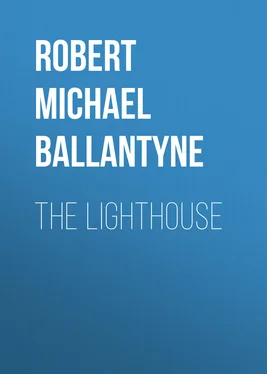Robert Michael Ballantyne - The Lighthouse
Здесь есть возможность читать онлайн «Robert Michael Ballantyne - The Lighthouse» — ознакомительный отрывок электронной книги совершенно бесплатно, а после прочтения отрывка купить полную версию. В некоторых случаях можно слушать аудио, скачать через торрент в формате fb2 и присутствует краткое содержание. Жанр: Детские приключения, literature_19, foreign_antique, foreign_prose, foreign_children, на английском языке. Описание произведения, (предисловие) а так же отзывы посетителей доступны на портале библиотеки ЛибКат.
- Название:The Lighthouse
- Автор:
- Жанр:
- Год:неизвестен
- ISBN:нет данных
- Рейтинг книги:4 / 5. Голосов: 1
-
Избранное:Добавить в избранное
- Отзывы:
-
Ваша оценка:
- 80
- 1
- 2
- 3
- 4
- 5
The Lighthouse: краткое содержание, описание и аннотация
Предлагаем к чтению аннотацию, описание, краткое содержание или предисловие (зависит от того, что написал сам автор книги «The Lighthouse»). Если вы не нашли необходимую информацию о книге — напишите в комментариях, мы постараемся отыскать её.
The Lighthouse — читать онлайн ознакомительный отрывок
Ниже представлен текст книги, разбитый по страницам. Система сохранения места последней прочитанной страницы, позволяет с удобством читать онлайн бесплатно книгу «The Lighthouse», без необходимости каждый раз заново искать на чём Вы остановились. Поставьте закладку, и сможете в любой момент перейти на страницу, на которой закончили чтение.
Интервал:
Закладка:
“When is it to be, brother?”
“When is what to be, sister?”
“The—the marriage.”
“I tell you I ain’t a-goin’ to marry,” repeated the captain; “though why a stout young feller like me, just turned sixty-four, shouldn’t marry, is more than I can see. You know the old proverbs, lass—‘It’s never too late to marry;’ ‘Never ventur’, never give in;’ ‘John Anderson my jo John, when we was first—first—’”
“Married,” suggested Minnie.
“Just so,” responded the captain, “and everybody knows that he was an old man. But no, I’m not goin’ to marry; I’m only goin’ to give up my house, sell off the furniture, and come and live with you .”
“Live with me!” ejaculated Mrs Brand.
“Ay, an’ why not? What’s the use o’ goin’ to the expense of two houses when one’ll do, an’ when we’re both raither scrimp o’ the ready? You’ll just let me have the parlour. It never was a comf’rable room to sit in, so it don’t matter much your givin’ it up; it’s a good enough sleepin’ and smokin’ cabin, an’ we’ll all live together in the kitchen. I’ll throw the whole of my treemendous income into the general purse, always exceptin’ a few odd coppers, which I’ll retain to keep me a-goin’ in baccy. We’ll sail under the same flag, an’ sit round the same fire, an’ sup at the same table, and sleep in the same—no, not exactly that, but under the same roof-tree, which’ll be a more hoconomical way o’ doin’ business, you know; an’ so, old girl, as the song says—
“‘Come an’ let us be happy together,
For where there’s a will there’s a way,
An’ we won’t care a rap for the weather
So long as there’s nothin’ to pay.’”
“Would it not be better to say, ‘so long as there’s something to pay?’” suggested Minnie.
“No, lass, it wouldn’t ,” retorted the captain. “You’re too fond of improvin’ things. I’m a stanch old Tory, I am. I’ll stick to the old flag till all’s blue. None o’ your changes or improvements for me.”
This was a rather bold statement for a man to make who improved upon almost every line he ever quoted; but the reader is no doubt acquainted with parallel instances of inconsistency in good men even in the present day.
“Now, sister,” continued Captain Ogilvy, “what d’ye think of my plan?”
“I like it well, brother,” replied Mrs Brand with a gentle smile. “Will you come soon?”
“To-morrow, about eight bells,” answered the captain promptly.
This was all that was said on the subject. The thing was, as the captain said, settled off-hand, and accordingly next morning he conveyed such of his worldly goods as he meant to retain possession of to his sister’s cottage—“the new ship”, as he styled it. He carried his traps on his own broad shoulders, and the conveyance of them cost him three distinct trips.
They consisted of a huge sea-chest, an old telescope more than a yard long, and cased in leather; a quadrant, a hammock, with the bedding rolled up in it, a tobacco-box, the enormous old Family Bible in which the names of his father, mother, brothers, and sisters were recorded; and a brown teapot with half a lid. This latter had belonged to the captain’s mother, and, being fond of it, as it reminded him of the “old ooman”, he was wont to mix his grog in it, and drink the same out of a teacup, the handle of which was gone, and the saucer of which was among the things of the past.
Notwithstanding his avowed adherence to Tory principles, Captain Ogilvy proceeded to make manifold radical changes and surprising improvements in the little parlour, insomuch that when he had completed the task, and led his sister carefully (for she was very feeble) to look at what he had done, she became quite incapable of expressing herself in ordinary language; positively refused to believe her eyes, and never again entered that room, but always spoke of what she had seen as a curious dream!
No one was ever able to discover whether there was not a slight tinge of underlying jocularity in this remark of Mrs Brand, for she was a strange and incomprehensible mixture of shrewdness and innocence; but no one took much trouble to find out, for she was so lovable that people accepted her just as she was, contented to let any small amount of mystery that seemed to be in her to remain unquestioned.
“The parlour” was one of those well-known rooms which are occasionally met with in country cottages, the inmates of which are not wealthy. It was reserved exclusively for the purpose of receiving visitors. The furniture, though old, threadbare, and dilapidated, was kept scrupulously clean, and arranged symmetrically. There were a few books on the table, which were always placed with mathematical exactitude, and a set of chairs, so placed as to give one mysteriously the impression that they were not meant to be sat upon. There was also a grate, which never had a fire in it, and was never without a paper ornament in it, the pink and white aspect of which caused one involuntarily to shudder.
But the great point, which was meant to afford the highest gratification to the beholder, was the chimney-piece. This spot was crowded to excess in every square inch of its area with ornaments, chiefly of earthenware, miscalled china, and shells. There were great white shells with pink interiors, and small brown shells with spotted backs. Then there were china cups and saucers, and china shepherds and shepherdesses, represented in the act of contemplating the heavens serenely, with their arms round each other’s waists. There were also china dogs and cats, and a huge china cockatoo as a centre-piece; but there was not a single spot the size of a sixpence on which the captain could place his pipe or his tobacco-box!
“We’ll get these things cleared away,” said Minnie, with a laugh, on observing the perplexed look with which the captain surveyed the chimney-piece, while the changes above referred to were being made in the parlour; “we have no place ready to receive them just now, but I’ll have them all put away to-morrow.”
“Thank’ee, lass,” said the captain, as he set down the sea-chest and seated himself thereon; “they’re pretty enough to look at, d’ye see, but they’re raither in the way just now, as my second mate once said of the rocks when we were cruising off the coast of Norway in search of a pilot.”
The ornaments were, however, removed sooner than anyone had anticipated. The next trip that the captain made was for his hammock (he always slept in one), which was a long unwieldy bundle, like a gigantic bolster. He carried it into the parlour on his shoulder, and Minnie followed him.
“Where shall I sling it, lass?”
“Here, perhaps,” said Minnie.
The captain wheeled round as she spoke, and the end of the hammock swept the mantelpiece of all its ornaments, as completely as if the besom of destruction had passed over it.
“Shiver my timbers!” gasped the captain, awestruck by the hideous crash that followed.
“You’ve shivered the ornaments at any rate,” said Minnie, half-laughing and half-crying.
“So I have, but no matter. Never say die so long’s there a shot in the locker. There’s as good fish in the sea as ever come out of it; so bear a hand, my girl, and help me to sling up the hammock.”
The hammock was slung, the pipe of peace was smoked, and thus Captain Ogilvy was fairly installed in his sister’s cottage.
It may, perhaps, be necessary to remind the reader that all this is a long digression; that the events just narrated occurred a few days before the return of Ruby, and that they have been recorded here in order to explain clearly the reason of the captain’s appearance at the supper table of his sister, and the position which he occupied in the family.
Читать дальшеИнтервал:
Закладка:
Похожие книги на «The Lighthouse»
Представляем Вашему вниманию похожие книги на «The Lighthouse» списком для выбора. Мы отобрали схожую по названию и смыслу литературу в надежде предоставить читателям больше вариантов отыскать новые, интересные, ещё непрочитанные произведения.
Обсуждение, отзывы о книге «The Lighthouse» и просто собственные мнения читателей. Оставьте ваши комментарии, напишите, что Вы думаете о произведении, его смысле или главных героях. Укажите что конкретно понравилось, а что нет, и почему Вы так считаете.












